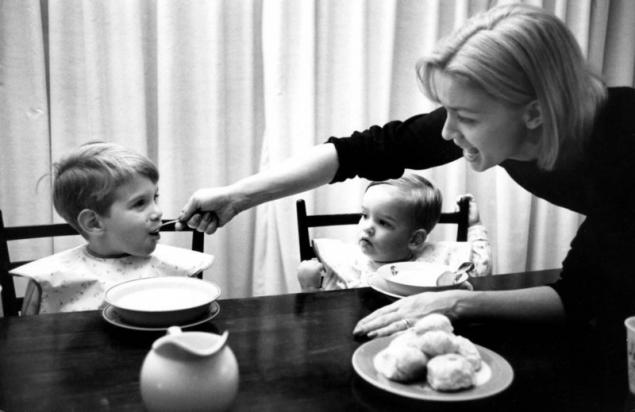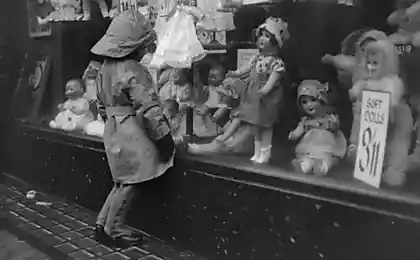664
Under-loved child
Very much in the fate and life of man depends on what was his early relationship with his mother (first 3 years). Psychoanalysis gives this extremely important.
D. Winnicot (the famous British psychoanalyst, pediatrician) writes about the "good enough mother", the French psychoanalysts about mother temptress mother seduces child for life with his love. Only filled with her love, the child can let go of the mother and to draw their love and desire for others.
As it happens, and what happens with the child, and then adult, if his early relations with the mother were unsuccessful and her love were not enough? How psychoanalysis can help here? This will be discussed further.

Wounded narcissism
The baby is completely helpless and dependent on his mother. He does not separate himself from the mother initially. There is still no one who can separate, that is, to perceive (subject), as there is still individual mom (of an object), and there is a pleasant sensation when his needs are satisfied and discomfort when he feels a painful tension of unmet need (hunger, cold).
Only gradually accumulate and zapechatlelas in the memory of the child, a pleasant feeling of satisfaction associated with the presence of his mother: her voice, her smell, the warmth of her body and with her image (the child begins to smile, seeing the mother). But this linking of sensations with the image of the mother may occur only during her absence — when the child re-experience painful bodily excitement, requiring discharge.
The voltage experienced by the child revives in his mind the memory of previous satisfactions (the mother), he's hallucinating her and it helps him to withstand the frustration of waiting. So there is gradually a child who wants his mother (subject) is her real mother, who is beside him no (object). There is an inner world and the external, the internal representation of mom and real mom.
Of course, years to 3 this internal image of the mother — not the complete image of a separate human child with their independent child's desires, your inner world. While the child's relationship to the mother is functionally, as a thing (in the beginning it is only her Breasts, but it is the mouth) that appears in his desire to satisfy him. He is "her Lord", he possesses it, and she was his property.
This period of the state of the omnipotence of the child in psychoanalysis is called the primary nacissism. It creates the necessary Foundation for the further development and separation from the mother, gives him a reliable feeling of values, his being, his self, because its kernel is the identification (assignment qualities of a child loving his mother) of the child meet his mother.
Only gradually can he give up his omnipotence, recognizing her right to their desires ( here the father of the child to which mother is leaving him) and discovering more of their own resources, autonomy and desires not related to the mother.
But it doesn't always happen.

There are three options of behavior of mother during this period, which lead to the most serious violations of a child's development:
An overprotective mother
This is a worrying mother, anticipating the desire of the child. She hangs over him, not allowing him to feel the desire, making it thus non-existent. The child is not formed I that can it as the mother does not allow "clearance" for the emergence of desire.
In addition, constantly tugging and stimulating a child (" what if something is wrong, it is bad!") it supports it in the excited state (up to 2.5 years to rape the child, believing it "healthier").
An absent mother
This is the mother "abandoned" child. Temporary the child's ability to cope with the helplessness and stress, hallucinating the satisfaction is limited. If mom will not be too long, then the growing excitement, pain, and rage makes his desire for her (the idea of it) is useless and meaningless, it is "erased".
And somatic arousal, rage, not related to the images and ideas that accumulate in the body, are a source of psychosomatic diseases.
Mother, meet at random
This is the mother of the child, satisfied out of place. She's not expecting it "request", attributes to him his own desires: feeding, when the child is cold, or hides it when he wants to eat. It gives him the desire distorted meaning, which further leads to the inability to communicate your feelings, your somatic arousal with a corresponding desire.
The mother of such a translator incorrectly translates the wishes of the child. Her words are meaningless for the child as well as her love.
These behaviors of mothers result in serious wounds (holes) in the primary narcissism of the child, i.e., in the sense of his own being, of life, of his self. His narcissism is very fragile and unstable, and in the most severe cases, his sense of himself as a separate personality simply does not arise.
Psychosis – a complete fusion with the mother, it is surrounded by, their own desires thrown outward and are perceived by them in the form of his frightening hallucinations and delusions, perceived as external reality.

Symbolization
When good enough mother, giving space for the emergence of the child's desires, allowing him mad at her for what she was missing, the child is not afraid that his desires and his anger will destroy her mother.
As a mother, understands and accepts the wrath of their hungry and longing for her child, and sustains it, giving it desires the word: "You bite me, because they are hungry and angry, I can't come!", "You shout and beat me because you're cold, and I was not!" etc. Words of a loving mother, help the child to symbolize its status, to become desires.
This means that his somatic arousal and tension mother words gives meaning to, she ties his somatic sensations with their images with their own desires for a child. So the mother called the first translator of the wishes of the child – she words it connects somatic sensation wish aimed at her (symbolizing them).
Symbolization helps the child to find the boundaries between self and mother, between her body and his. Initially, this boundary is not, as itself, because it is dissolved in the parent universe with only her words filled with love for him help him to find himself separate from his mother.
Patients with the "wounded" primary narcissism had mothers who were poorly symbolized wishes of the child. It is mothers who have little to say, and more doing something with a child or for a child, treating him like a thing, or distort their perception, give it a wrong meaning. Then, when such a patient seeks help, this work of symbolization and the recovery of meaning instead of the mother remains to be done by the analyst in the process of playing with the patient in the transference of the relations that have been patient with my parents.
Mother – lover of a father
Mother can help your child become an independent person and "to feel that life is creative and fascinating adventure" (Joyce McDougall, a brilliant French psychoanalyst), only if the film has contact with a third party — the child's father.
If the child's mother is not satisfying her love relationship with the father of the child, or this relationship is very conflicting, it runs the risk of unconsciously using the child as a sexual or narcissistic (supporting its importance, self-esteem) object for myself. There are women who are so naive and say: "I want a baby for yourself!" "Man I don't need!".
I mean, this baby is designed for plugging holes in her wounded primary narcissism and its lack in a man: to be the phallus (the thing she is proud of), "plugging her vagina". The French psychoanalyst Jacques Lacan, speaking about the unconscious desires of the mother against the child, offered this metaphor: "Mother like a hungry crocodile, eager to swallow the child, to get him back in my womb and only the paternal phallus inserted into the insatiable maw that is able to save the child from swallowing it!".
If the mother is not in your head there is a sexual, desired it the image of the father, the child was originally destined to be the mother's continuation and in direct and figurative sense. French psychoanalysts call such a child – "child of the night".
Often what happens is instead of her husband in bed at night with her mother sleeping child. For her, the child becomes unconscious replacement of the father figure as a sex object (see an overprotective mother).
If the mother wants the baby to be mentally developed, she must follow his wishes, but he must serve her sexual desires. And for that she needs to love and be loved by the father of the child. He is in a relationship the third party and his presence just gives her the opportunity to be a mother for her child, putting him in his love as in "child of the day".
The alternation of day and night can be compared with the alternation of presence and absence of the mother for the child. When she's not with child, she with her father. She puts the baby to sleep and becomes a sexy woman for a sexy father. French psychoanalysts call it "censorship mistress". It starts and phantasmatic structures a child's life: so he could dream and imagine what is happening in the parents ' bedroom (between the parents), the door to that bedroom must be closed.
It helps him gradually to separate your desires from the desires of the mother, child sexuality, from adult genital sexuality, adult relationships of father and mother from his children's relations with her mother from a woman (mistresses dad). And, most importantly, it helps him make "the law of the father" "the word father": the father to the mother is important to the child, the child — is not EVERYTHING for his mother, he is not responsible for the happiness (satisfaction) of his mother.

Psychoanalysis, as a way out of hopelessness
As adults, children whose mother excluded the father from the relationship (absent or weak, the "castrated" father, agreeing to his secondary role in the relationship between him, his wife and child) have a serious problem in the construction of their own love relationships as they are still psychologically dependent and associated with his mother, feeling unhappy and responsible for the misfortune of their parents, and primarily mothers.
This happens due to the fact that this child was a child involved in an adult relationship of father and mother, and became the one who separates them (in a normal family, sharing a father). To build their own adult relationship with a partner, you must end the relationship with her own mother. To enter a new relationship, you need to withdraw from old relationships (old mother).
If not, then all attempts to build new relations are perceived as a repetition of the old failed relationship (the Mother of one of my patients said to his daughter: "Men appear and go, they can not be trusted, and mom, you will always have!" — so, you're my you can be and draw more and it will be forever).
Then your own state is perceived as hopeless, because there is no third. Psychoanalysis and psychoanalyst for these patients becomes a third party, which lacked in the relationship with her mother that helps to restore the "law of the father" in the patient's head and see the output.published
Author: Marina Lastovka
Also interested in: Young father: the third is not superfluous
These terrible two!
P. S. And remember, only by changing their consumption — together we change the world! ©
Join us in Facebook , Vkontakte, Odnoklassniki
Source: luckyparents.club/%D0%BD%D0%B5%D0%B4%D0%BE%D0%BB%D1%8E%D0%B1%D0%BB%D0%B5%D0%BD%D0%BD%D1%8B%D0%B9-%D1%80%D0%B5%D0%B1%D0%B5%D0%BD%D0%BE%D0%BA/
D. Winnicot (the famous British psychoanalyst, pediatrician) writes about the "good enough mother", the French psychoanalysts about mother temptress mother seduces child for life with his love. Only filled with her love, the child can let go of the mother and to draw their love and desire for others.
As it happens, and what happens with the child, and then adult, if his early relations with the mother were unsuccessful and her love were not enough? How psychoanalysis can help here? This will be discussed further.

Wounded narcissism
The baby is completely helpless and dependent on his mother. He does not separate himself from the mother initially. There is still no one who can separate, that is, to perceive (subject), as there is still individual mom (of an object), and there is a pleasant sensation when his needs are satisfied and discomfort when he feels a painful tension of unmet need (hunger, cold).
Only gradually accumulate and zapechatlelas in the memory of the child, a pleasant feeling of satisfaction associated with the presence of his mother: her voice, her smell, the warmth of her body and with her image (the child begins to smile, seeing the mother). But this linking of sensations with the image of the mother may occur only during her absence — when the child re-experience painful bodily excitement, requiring discharge.
The voltage experienced by the child revives in his mind the memory of previous satisfactions (the mother), he's hallucinating her and it helps him to withstand the frustration of waiting. So there is gradually a child who wants his mother (subject) is her real mother, who is beside him no (object). There is an inner world and the external, the internal representation of mom and real mom.
Of course, years to 3 this internal image of the mother — not the complete image of a separate human child with their independent child's desires, your inner world. While the child's relationship to the mother is functionally, as a thing (in the beginning it is only her Breasts, but it is the mouth) that appears in his desire to satisfy him. He is "her Lord", he possesses it, and she was his property.
This period of the state of the omnipotence of the child in psychoanalysis is called the primary nacissism. It creates the necessary Foundation for the further development and separation from the mother, gives him a reliable feeling of values, his being, his self, because its kernel is the identification (assignment qualities of a child loving his mother) of the child meet his mother.
Only gradually can he give up his omnipotence, recognizing her right to their desires ( here the father of the child to which mother is leaving him) and discovering more of their own resources, autonomy and desires not related to the mother.
But it doesn't always happen.

There are three options of behavior of mother during this period, which lead to the most serious violations of a child's development:
An overprotective mother
This is a worrying mother, anticipating the desire of the child. She hangs over him, not allowing him to feel the desire, making it thus non-existent. The child is not formed I that can it as the mother does not allow "clearance" for the emergence of desire.
In addition, constantly tugging and stimulating a child (" what if something is wrong, it is bad!") it supports it in the excited state (up to 2.5 years to rape the child, believing it "healthier").
An absent mother
This is the mother "abandoned" child. Temporary the child's ability to cope with the helplessness and stress, hallucinating the satisfaction is limited. If mom will not be too long, then the growing excitement, pain, and rage makes his desire for her (the idea of it) is useless and meaningless, it is "erased".
And somatic arousal, rage, not related to the images and ideas that accumulate in the body, are a source of psychosomatic diseases.
Mother, meet at random
This is the mother of the child, satisfied out of place. She's not expecting it "request", attributes to him his own desires: feeding, when the child is cold, or hides it when he wants to eat. It gives him the desire distorted meaning, which further leads to the inability to communicate your feelings, your somatic arousal with a corresponding desire.
The mother of such a translator incorrectly translates the wishes of the child. Her words are meaningless for the child as well as her love.
These behaviors of mothers result in serious wounds (holes) in the primary narcissism of the child, i.e., in the sense of his own being, of life, of his self. His narcissism is very fragile and unstable, and in the most severe cases, his sense of himself as a separate personality simply does not arise.
Psychosis – a complete fusion with the mother, it is surrounded by, their own desires thrown outward and are perceived by them in the form of his frightening hallucinations and delusions, perceived as external reality.

Symbolization
When good enough mother, giving space for the emergence of the child's desires, allowing him mad at her for what she was missing, the child is not afraid that his desires and his anger will destroy her mother.
As a mother, understands and accepts the wrath of their hungry and longing for her child, and sustains it, giving it desires the word: "You bite me, because they are hungry and angry, I can't come!", "You shout and beat me because you're cold, and I was not!" etc. Words of a loving mother, help the child to symbolize its status, to become desires.
This means that his somatic arousal and tension mother words gives meaning to, she ties his somatic sensations with their images with their own desires for a child. So the mother called the first translator of the wishes of the child – she words it connects somatic sensation wish aimed at her (symbolizing them).
Symbolization helps the child to find the boundaries between self and mother, between her body and his. Initially, this boundary is not, as itself, because it is dissolved in the parent universe with only her words filled with love for him help him to find himself separate from his mother.
Patients with the "wounded" primary narcissism had mothers who were poorly symbolized wishes of the child. It is mothers who have little to say, and more doing something with a child or for a child, treating him like a thing, or distort their perception, give it a wrong meaning. Then, when such a patient seeks help, this work of symbolization and the recovery of meaning instead of the mother remains to be done by the analyst in the process of playing with the patient in the transference of the relations that have been patient with my parents.
Mother – lover of a father
Mother can help your child become an independent person and "to feel that life is creative and fascinating adventure" (Joyce McDougall, a brilliant French psychoanalyst), only if the film has contact with a third party — the child's father.
If the child's mother is not satisfying her love relationship with the father of the child, or this relationship is very conflicting, it runs the risk of unconsciously using the child as a sexual or narcissistic (supporting its importance, self-esteem) object for myself. There are women who are so naive and say: "I want a baby for yourself!" "Man I don't need!".
I mean, this baby is designed for plugging holes in her wounded primary narcissism and its lack in a man: to be the phallus (the thing she is proud of), "plugging her vagina". The French psychoanalyst Jacques Lacan, speaking about the unconscious desires of the mother against the child, offered this metaphor: "Mother like a hungry crocodile, eager to swallow the child, to get him back in my womb and only the paternal phallus inserted into the insatiable maw that is able to save the child from swallowing it!".
If the mother is not in your head there is a sexual, desired it the image of the father, the child was originally destined to be the mother's continuation and in direct and figurative sense. French psychoanalysts call such a child – "child of the night".
Often what happens is instead of her husband in bed at night with her mother sleeping child. For her, the child becomes unconscious replacement of the father figure as a sex object (see an overprotective mother).
If the mother wants the baby to be mentally developed, she must follow his wishes, but he must serve her sexual desires. And for that she needs to love and be loved by the father of the child. He is in a relationship the third party and his presence just gives her the opportunity to be a mother for her child, putting him in his love as in "child of the day".
The alternation of day and night can be compared with the alternation of presence and absence of the mother for the child. When she's not with child, she with her father. She puts the baby to sleep and becomes a sexy woman for a sexy father. French psychoanalysts call it "censorship mistress". It starts and phantasmatic structures a child's life: so he could dream and imagine what is happening in the parents ' bedroom (between the parents), the door to that bedroom must be closed.
It helps him gradually to separate your desires from the desires of the mother, child sexuality, from adult genital sexuality, adult relationships of father and mother from his children's relations with her mother from a woman (mistresses dad). And, most importantly, it helps him make "the law of the father" "the word father": the father to the mother is important to the child, the child — is not EVERYTHING for his mother, he is not responsible for the happiness (satisfaction) of his mother.

Psychoanalysis, as a way out of hopelessness
As adults, children whose mother excluded the father from the relationship (absent or weak, the "castrated" father, agreeing to his secondary role in the relationship between him, his wife and child) have a serious problem in the construction of their own love relationships as they are still psychologically dependent and associated with his mother, feeling unhappy and responsible for the misfortune of their parents, and primarily mothers.
This happens due to the fact that this child was a child involved in an adult relationship of father and mother, and became the one who separates them (in a normal family, sharing a father). To build their own adult relationship with a partner, you must end the relationship with her own mother. To enter a new relationship, you need to withdraw from old relationships (old mother).
If not, then all attempts to build new relations are perceived as a repetition of the old failed relationship (the Mother of one of my patients said to his daughter: "Men appear and go, they can not be trusted, and mom, you will always have!" — so, you're my you can be and draw more and it will be forever).
Then your own state is perceived as hopeless, because there is no third. Psychoanalysis and psychoanalyst for these patients becomes a third party, which lacked in the relationship with her mother that helps to restore the "law of the father" in the patient's head and see the output.published
Author: Marina Lastovka
Also interested in: Young father: the third is not superfluous
These terrible two!
P. S. And remember, only by changing their consumption — together we change the world! ©
Join us in Facebook , Vkontakte, Odnoklassniki
Source: luckyparents.club/%D0%BD%D0%B5%D0%B4%D0%BE%D0%BB%D1%8E%D0%B1%D0%BB%D0%B5%D0%BD%D0%BD%D1%8B%D0%B9-%D1%80%D0%B5%D0%B1%D0%B5%D0%BD%D0%BE%D0%BA/























